Judi Lynn
Judi Lynn's JournalClimate change: Logging decline after political change in Brazil, Colombia
2 days ago
By Matt McGrath,
Environment correspondent

Observers say government action in Colombia has led to a reduction in primary forest loss
The number of trees lost in tropical forests in Brazil and Colombia fell dramatically last year because of political action, a new analysis finds.
Researchers say new leaders have prioritised the environment, with tree losses in the Brazilian Amazon down by a huge 39%.
. . .
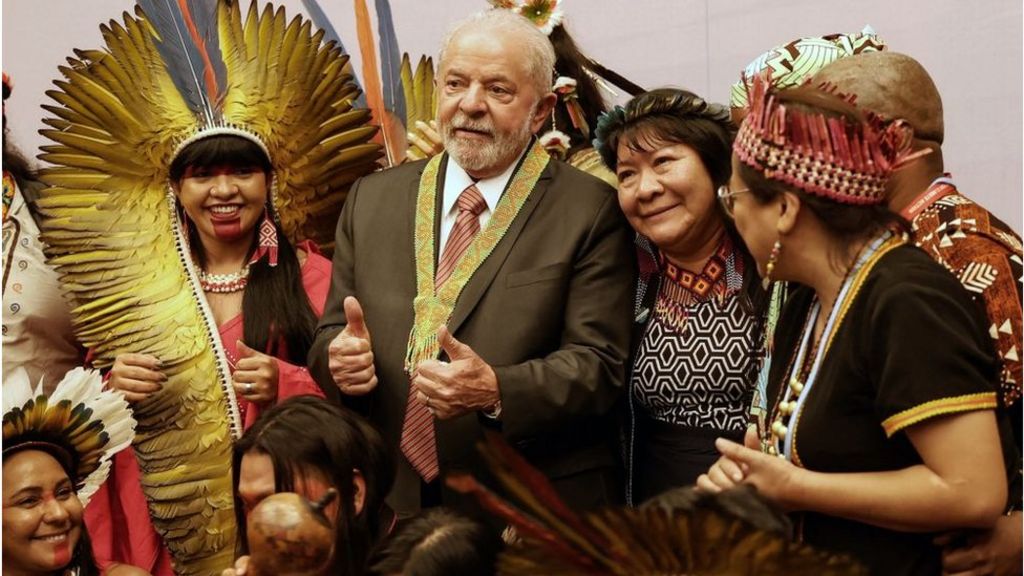
The return to government of President Lula has coincided with a dramatic drop in forest losses in Brazil
In 2023, the tropics saw 3.7 million hectares of forest lost - equivalent to 10 football fields per minute, a slight decline on last year. These losses would have been far higher if it wasn't for Brazil and Colombia.
According to this new analysis, political action in both countries has had a significant impact on tree felling.
President Luiz Inacio Lula da Silva came to power in Brazil last year promising to tackle tree losses and end deforestation by 2030.
As a result, there has been a 36% drop in primary forest losses in Brazil in 2023, compared to 2022.
"I think what we're seeing in Brazil, for example, is really a case of putting law enforcement back in place that was dismantled during the previous government," said Rod Taylor from WRI.
Given that Brazil was responsible for 43% of all tropical forest loss in 2022, this reduction is significant.
More:
https://www.bbc.com/news/science-environment-68716874
(What a shock, learning progressive leaders protect the interests of the people, rather than the 1%!)
Milei reopens debate about Argentina's dictatorship, Armed Forces
TODAY 18:51
President enrages human rights groups by questioning estimate of those disappeared by junta’s security forces and calls for “reconciliation” of the military in Argentina.
As he hinted during last year’s presidential campaign, Javier Milei has reopened the debate about Argentina’s brutal 1976-1983 military dictatorship and the role of the Armed Forces.
He has done so by questioning the estimates from human rights groups as to the number of disappeared and proposing that the military assist internal security operations in the country.
At a remembrance ceremony on Tuesday with Malvinas war veterans, the far-right leader claimed that the Armed Forces had been “harassed and humiliated” by politicians since the return of democracy. He vowed to clean the military’s name.
Controversy
On March 24, the anniversary of the coup that brought the dictatorship to power, Milei’s government disseminated a video questioning the figure of 30,000 disappeared people during the dictatorship, an estimate agreed by several human rights organisations. The real figure is impossible to establish, given how many remain missing from those dark days.
Last month, the President announced his intention to alter legislation to allow the military to intervene in domestic security operations.
More:
https://www.batimes.com.ar/news/argentina/milei-reopens-debate-about-dictatorship-and-the-role-of-the-armed-forces-in-argentina.phtml
Democrats call on Biden to declassify documents on Brazil's dictatorship for 60th anniversary
BY LAURA KELLY THEHILL.COM
UPDATED APRIL 04, 2024 2:59 PM
A group of House Democrats is marking the 60th anniversary of Brazil's 1964 military coup by calling on President Biden to declassify U.S. government documents detailing atrocities and human rights abuses during the nation's more than two-decade military dictatorship.
Reps. Nydia Velázquez (D-N.Y.) and Susan Wild (D-Pa.) led more than a dozen colleagues in a letter to the president and Secretary of State Antony Blinken requesting that 13 specific documents be declassified in an effort to build stronger ties with Brazilian civil society.
"As the 60th anniversary of the military coup in Brazil approaches and we celebrate the bicentennial of U.S.-Brazil relations, we emphasize that transparency and historical understanding are crucial components of fostering strong international partnerships," the lawmakers wrote.
"As we strive to foster open dialogue and strengthen the ties between our nations, we believe that declassifying these documents will demonstrate our dedication to transparency, justice, and the advancement of democratic principles," they continued.
More:
https://www.newsobserver.com/news/politics-government/article287393100.html
Collapse of Chavin culture was followed by a period of violence
By:
Mark Milligan
Date:April 2, 2024
Anthropology
Collapse of Chavin culture was followed by a period of violence
A skeletal analysis has revealed that a period of violence followed the collapse of the Chavín culture in Peru.
The Chavín culture was a pre-Columbian people that emerged in the Andean highlands of Peru around 900 BC. The Chavín were the main culture of the Early Horizon period and had an advanced understanding of metallurgy, ceramic production, irrigation, and an intensified religious cult.
Its center was Chavín de Huantar, a monumental ceremonial site in northern Peru in the Marañon River basin.
Just before the collapse of the culture around 500 and 400 BC, the Chavín people went through a turbulent period caused by political disintegration and inter-group violence, possibly caused by a transition from a theocracy to secular government. After the collapse, it is likely that surviving communities competed for the scant resources in the Supe Valley region.
A new study, published in the journal Latin American Antiquity, has analysed the skeletal remains of 67 individuals from a burial site in the Supe Valley region near Caral. The burials date from between 500-400 BC and show injury patterns characteristic of repeated events of interpersonal violence in 80% of the individuals.
More:
https://www.heritagedaily.com/2024/04/collapse-of-chavin-culture-was-followed-by-a-period-of-violence/151299
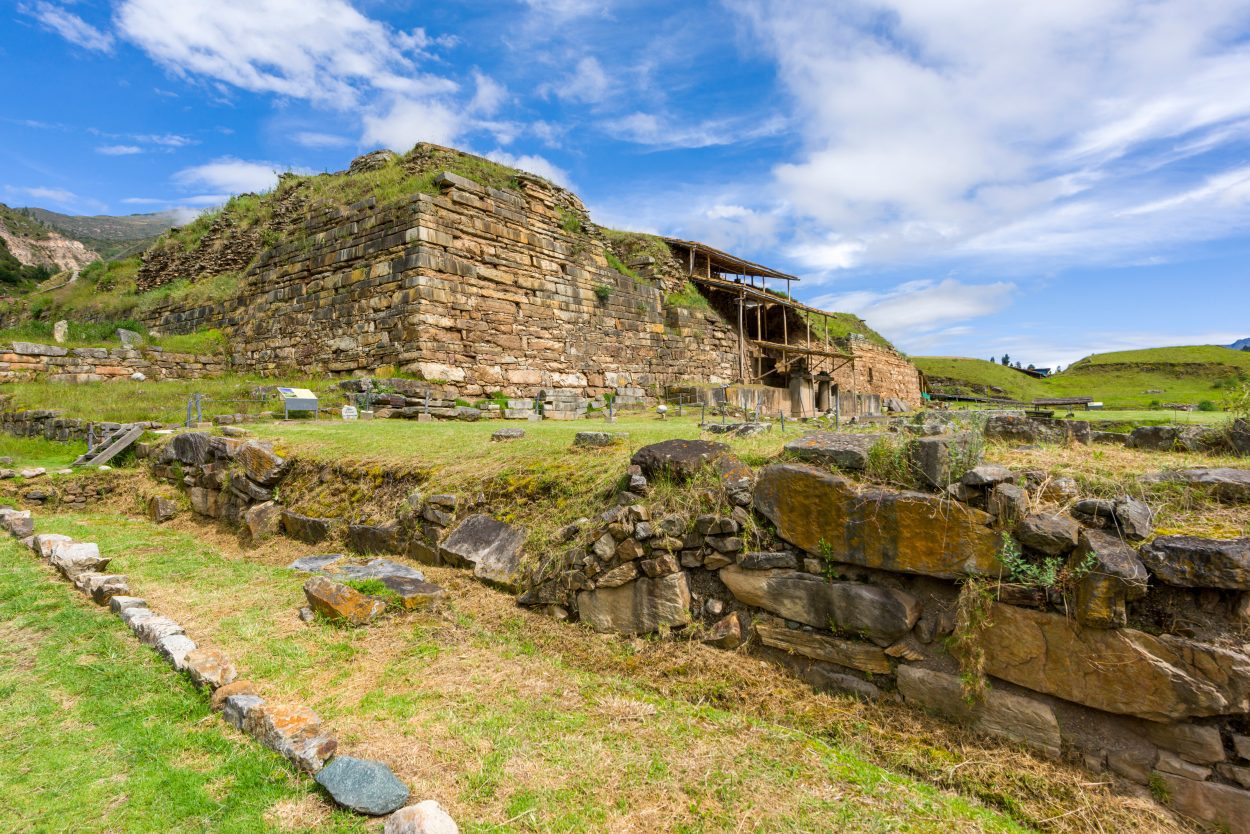

Underground Tunnels within the Main Temple of Chavin De Huantar

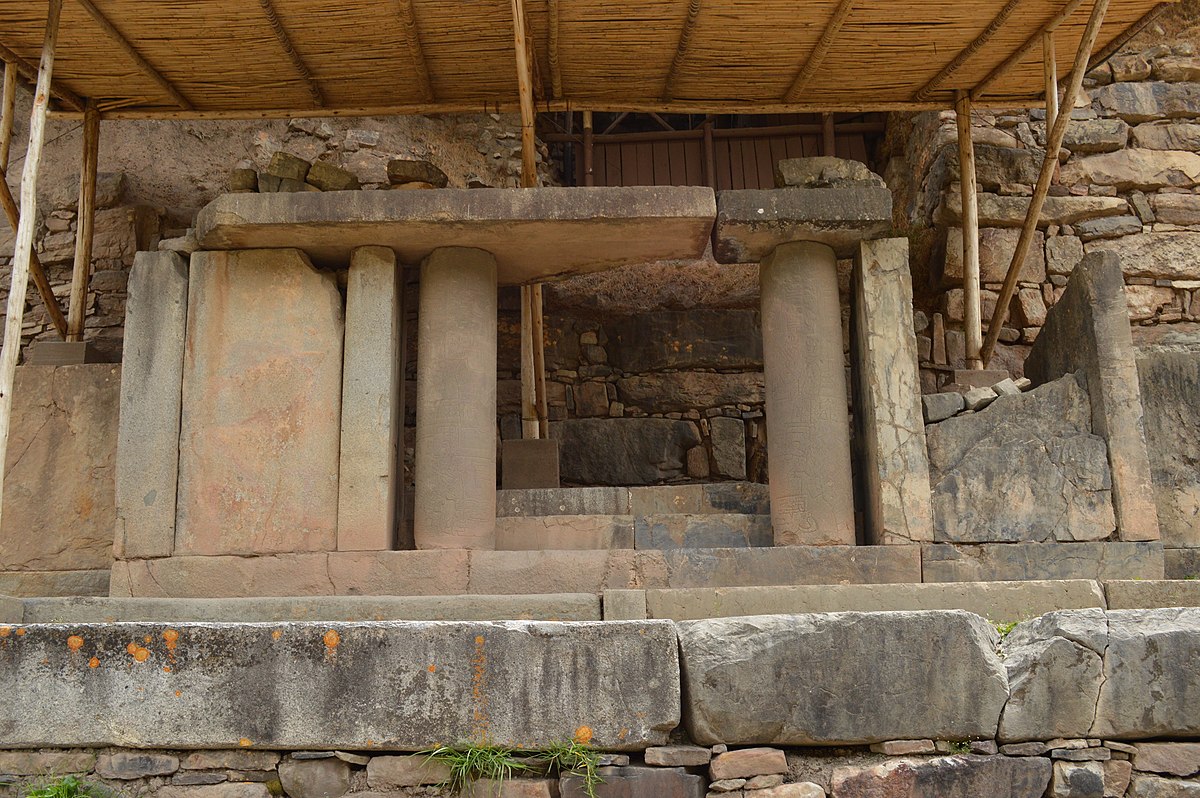

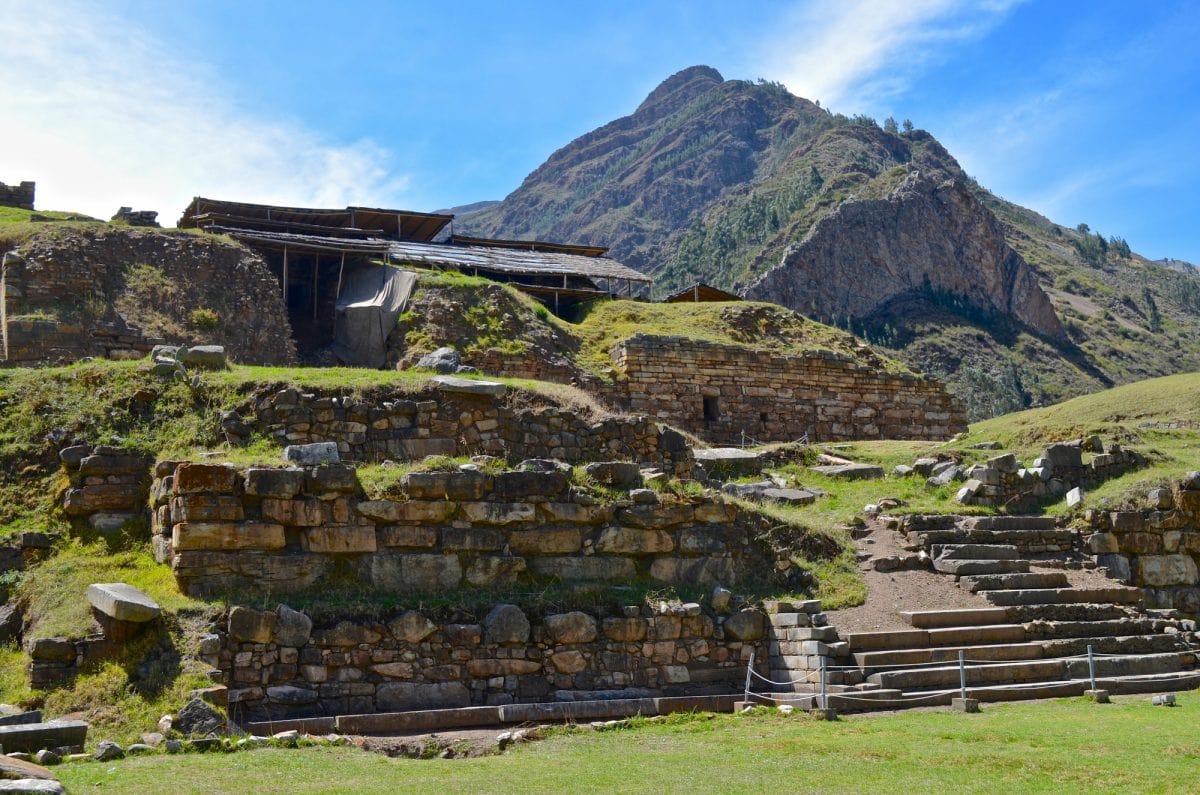


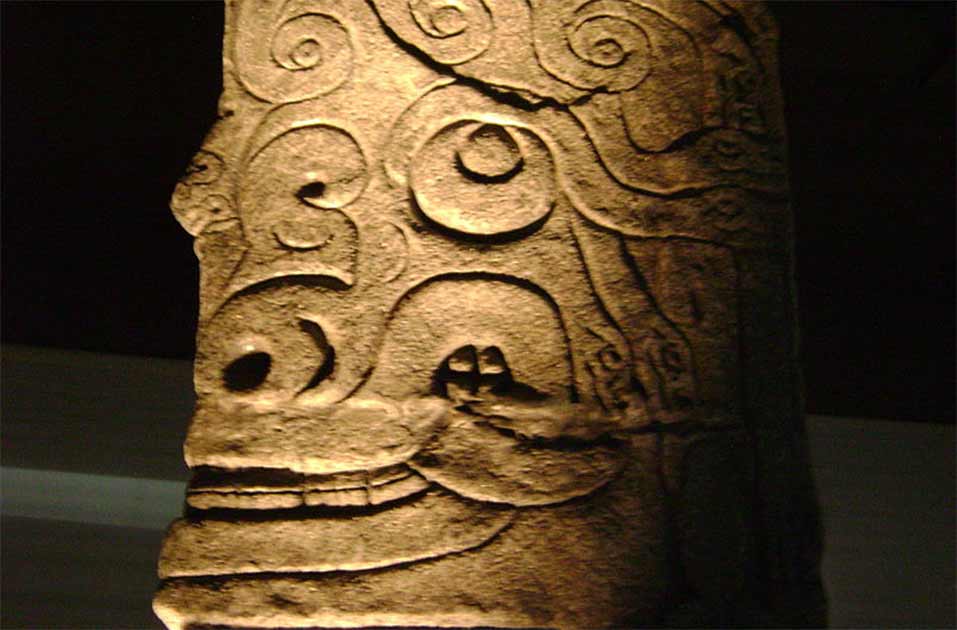



ETC.
Venezuelan Election Laws are Designed to Guarantee Democracy Despite Personal Ambitions
APRIL 1, 2024
BY NINO PAGLICCIA
Venezuela has one of the most progressive constitutions in the world spearheaded by former president Hugo Chavez in 1999. Article 1 sets the tone: “The Republic of Venezuela is forever and irrevocably free and independent from any domination or protection by a foreign power.” This is binding to everyone in Venezuela. The constitution is supported by a strong set of regulatory legislation that is also applied judiciously by the different government bodies and Venezuelan institutions under a strict democratic process determined to defend its sovereignty and independence. One piece of legislation in particular is relevant these days as the country approaches a democratic presidential election on July 28. That is the Organic Law of Electoral Processes. However, one ambitious candidate is willing to break the law – and with it the democratic process – in order to succeed in her intentions.
If you hear the US based media and some government officials you would think that Venezuela is a dictatorship that prevents political parties and presidential candidates to participate in the elections. One Venezuelan candidate would also try to convince you of that. She is Maria Corina Machado who is a member of one of the old Venezuelan elite families that has lost its prominence after the more egalitarian government of Hugo Chavez, but most dangerously represent the rightwing Vente Venezuela party determined to get rid of president Nicolas Maduro at all costs.
Ms. Machado has a long history of violating Venezuelan laws in her eagerness to regain the family ascendance by vehemently and violently rejecting the more popular ideology of Chavismo. She has been doing so not by seeking the support of the Venezuelan people but by seeking foreign support instead, namely from the United States.
Quite predictably, Washington actively promotes her as the opposition candidate and by doing so it sets the stage for delegitimising the Venezuelan presidential election.
In a recent article titled “Yet again US meddles in another nation’s elections” Venezuelan Canadian author and analyst María Páez Victor writes that the US government totally disregards the fact that “in 2015, Machado was disqualified from running for public office for 15 years, for corruption and for representing a foreign country (Panama) while being a Parliamentary deputy, which is forbidden by the Constitution. This disqualification has been ratified by the highest court, Venezuela’s Supreme Court.”
More:
https://www.counterpunch.org/2024/04/01/venezuelan-election-laws-are-designed-to-guarantee-democracy-despite-personal-ambitions/
Brazil remembers the 1964 coup and victims of the dictatorship
Brazil is remembering the 1964 coup that began on March 31 that year. The event 60 years ago sunk Brazil into a brutal 21-yearlong dictatorship that would last until 1985. Today, the country is still grappling with the meaning and memory of what happened.
The World
April 1, 2024 · 3:15 PM EDT
By Michael Fox

A convoy of Brazilian army troops, tanks and other vehicles pauses on the way to Rio de Janeiro, on April 1, 1964, after conspirators in the country's military high command overthrew the government and forced Brazilian President João Goulart to flee.
Photo/AP
On March 31, hundreds of people in the city of São Paulo, Brazil, walked to a former government detention and torture center in, in an event known as the "Walk of Silence." They were there to remember the anniversary of the 1964 coup and victims of the dictatorship, with many carrying large, black-and-white pictures of the victims.
In a video on YouTube, Angela Mendes de Almeida speaks to the crowd. “My husband was tortured and killed here,” she said. “It’s really hard for me. We have the obligation of continuing to demand punishment for the generals.”
During the military regime, hundreds were killed and disappeared. Thousands were detained and tortured.
Today, retiree Gracinda Gra has long gray hair and wears glasses. She was 6 years old on the day of the coup.
“The police came knocking at our door in São Paulo,” she said. "My dad was in a union. He went to jail. He was tortured. Just to remember it, givesme the chills."
On March 31, 1964, tanks rolled on the streets of Brasilia to overthrow President João Goulart, a member of Brazil’s Labor Party. He’d been pushing redistributive policies including tax reform, moderate agrarian reform and literacy campaigns.
More:
https://theworld.org/stories/2024-04-01/brazil-remembers-1964-coup-and-victims-dictatorship
EMILE MYBURGH: Beware the silence on Brazil's military dictatorship
Horrors committed under the military regime must be talked about, so that they can be avoided in future
02 APRIL 2024 - 05:00
by EMILE MYBURGH
On April 1, Brazil quietly celebrated the 60th anniversary of the beginning of one of its darkest chapters: the military coup against president João Goulart’s government, which resulted in a military dictatorship that lasted until 1985.
Brazilian President Luiz Inácio Lula da Silva curiously asked, presumably in a spirit of letting bygones be bygones, that Brazilians not make a big deal of this dubious milestone. I cannot agree with him. The horrors committed during the military regime must be talked about, so that they can be avoided in future and so that Brazil can heal.
Ostensibly, the coup was to fight communism, the eternal right-wing bogeyman in Brazil and elsewhere in Latin America. During the ensuing years hundreds of Brazilian students, teachers, academics and artists, all supposed communists or opponents of the dictatorship, were tortured and killed. The coup and military regime were widely supported by the US and middle and upper Brazilian classes and institutions such as the Catholic Church and anti-communist forces.
In 1968 the military regime doubled down on resistance and issued Institutional Act 5 (known as AI5), which resulted in extensive censorship, dissolution of Congress, restrictions on freedom of the press, and human rights abuses. These included arbitrary detention without trial or bail, torture — including by inserting cockroaches in bodily orifices and electric shocks — disappearances and murders.
More:
https://www.businesslive.co.za/bd/opinion/2024-04-02-emile-myburgh-beware-the-silence-on-brazils-military-dictatorship/
Watching US Cuba policy in the theater of the absurd
Cuban-American lawmakers slipped new sanctions into a bill designed to keep the federal government open. The White House is no better.
WILLIAM LEOGRANDE
APR 02, 2024
Trying to make sense of U.S. policy toward Cuba is like trying to make sense of a play in the theater of the absurd. The rationales offered by the policy’s defenders make no sense, and when they try to explain, they sound like characters in an Ionesco play. Recent legislative proposals from Cuban American members of the House of Representatives are prime examples.
Rep. Mario Díaz-Balart (R-Fla.), chair of the Appropriations Subcommittee on Foreign Operations, and Rep. María Elvira Salazar (R-Fla.), chair of the House Foreign Affairs Subcommittee on the Western Hemisphere, recently proposed new sanctions locking in Cuba’s groundless designation as a sponsor of international terrorism, blocking assistance to Cuba’s private sector on the grounds that it doesn’t exist, and punishing countries hosting Cuban medical missions for practicing “modern slavery.” The last two proposals became law in the omnibus appropriations bill passed last month to avoid a government shutdown.
Cuba is on the State Department’s terrorism list, even though the Department’s latest Country Report on Terrorism offers no evidence for Havana engaging in international terrorism. It cites Cuba’s harboring of U.S. fugitives who committed politically-motivated crimes in the United States more than 40 years ago. Meanwhile, the United States for years harbored notorious Cuban exiles like Orlando Bosch and Luis Posada Carriles guilty of myriad terrorist attacks against Cuba, including bombing a Cuban airline flight, killing all 73 people aboard, and bombing tourist hotels in Havana.
Early in the Biden administration, the White House said it was “committed to carefully reviewing” Cuba’s designation, and in October 2023, Secretary of State Antony Blinken told Colombia’s President Gustavo Petro, “We will continue as necessary to revisit those to see if Cuba continues to merit that designation.” But just five months later, he told Congress, “We are not planning to remove them from the list.” Deputy Assistant Secretary of State Eric Jacobstein told a group of Democratic lawmakers that, contrary to what they had been told previously, there was no review of Cuba’s designation underway.
More:
https://responsiblestatecraft.org/congress-cuba/
Javier Milei Wants Argentina to Forget Its Genocide
BY
DANIEL CHOLAKIAN
Every March 24, Argentinians gather to remember its 30,000 victims of state terrorism. New far-right president President Javier Milei has worked to deny that memory of crimes against humanity — and defend the crimes’ perpetrators.
On March 24, hundreds of thousands of Argentines took to the streets across the country under the banner of “Memory, Truth, Justice” for the crimes committed by the 1976–1983 military dictatorship. This year, marchers also protested against Javier Milei’s expressions of support for the dictatorship.
During a presidential debate in late 2023, Milei said, “We are absolutely against a one-eyed view of history.” He was responding to his opponent Sergio Massa in a discussion about the military dictatorship that began on March 24, 1976. He went on to say, “For us, in the 1970s, there was a war and in that war, the state forces carried out excesses.” Milei denied that the military repression left thirty thousand people disappeared, a figure derived from consensus among national and international organizations that investigate systematic violations of human rights.
Argentina returned to democracy in 1983, and in 2002, March 24 was declared an official day of remembrance. Every year people mobilize to declare their refusal to forget the disappeared and to proclaim that they never want state terrorism to be repeated.
The current administration is sympathetic to the dictatorship. One of the bloodiest illegal operations carried out by the military, known as Operativo Independencia, involved the disappearance of entire families and extrajudicial killings. The head of this operation was General Antonio Domingo Bussi. In the 1990s, before the late Bussi was sentenced to life imprisonment for crimes against humanity, Milei served as his adviser. Vice President Victoria Villarruel’s father was an army officer in that same military operation. Villarruel is also a member of organizations that call for the release of former military officers charged with crimes against humanity.
More:
https://jacobin.com/2024/04/argentina-genocide-remembrance-milei-denialism/
The Campaign to Smear AMLO as a Narco
By Kurt Hackbarth
March 26, 2024 Z Article
10 Mins Read
Source: Jacobin

Image by ProtoplasmaKid, Creative Commons 3.0
Mexico is headed for the largest election in its history. On June 2, 2024, the presidency, both houses of Congress, nine governorships, thirty-one state legislatures, and thousands of local offices will all be contested. One name that will not be anywhere on the ballot, however, is that of Mexico’s most famous politician: current president Andrés Manuel López Obrador (AMLO), who is limited by the constitution to a single, six-year term.
This has not made him any less of a target for attacks. As the election season heats up, AMLO continues to be a lightning rod for another campaign, one attempting to link him and the party he founded, Morena, with the drug cartels.
Accusation #1: There will be an alliance between Morena and organized crime in Mexico’s 2024 elections
On January 18, the Baker Institute for Public Policy at Rice University published its Mexico Country Outlook 2024. The “nonpartisan” institute, a hub of multinational energy interests financed by Chevron, ExxonMobil, Shell, British Petroleum, the Koch Foundation, the Mexican Business Council, and Kimberly-Clark de México (headed by opposition figure Claudio X. González Laporte), plays an important role in the cross-border media ecosystem as a purveyor of “nonpartisan analysis” and “data-driven research” that can then be lapped up by corporate outlets in need of an expert interview or report to cite.
In its Mexico Country Outlook, the institute did not disappoint its donors. In the midst of its standard laundering of right-wing talking points, it included the following juicy nugget: “Criminal organizations may even become an important electoral ally of MORENA in the June 2024 elections.” Later on, it doubles down more directly:
Despite US pressure, the [Andrés Manuel] López Obrador administration simply will not confront organized crime . . . which directly affect American interests. This is largely because the president’s party, MORENA, expects organized crime to operate in its favor during the 2024 elections.
More:
https://znetwork.org/znetarticle/the-campaign-to-smear-amlo-as-a-narco/
Profile Information
Member since: 2002Number of posts: 160,631